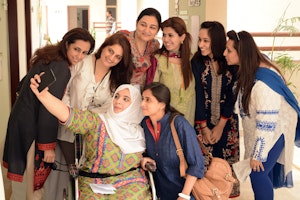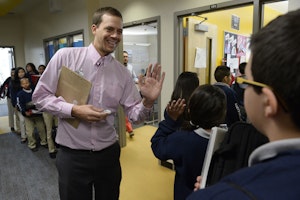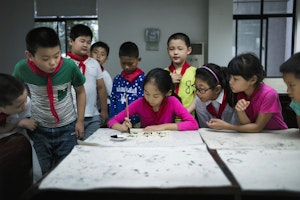Why Mothers of Children with Disabilities Are Suddenly Talking in Kyrgyzstan
By Kimberly O'Haver

Seventeen kilometers outside of Kyrgyzstan’s capital, Bishkek, in the village of Besh-Kungey (population 3,400), something amazing is happening: Mothers of children with disabilities are discussing openly the barriers they and their children face. Even though they have lived as neighbors for years, for the first time ever they are talking without fear of stigma or discrimination, sharing the past, comparing the present, and imagining the future—a future in which together they achieve their common goal of understanding and securing their children’s rights.
On a hot summer afternoon, Zhibek Ibraeva meets us along a dusty road and guides us to Besh-Kungey’s administration building. This is where the mothers meet and where we find the soft-spoken founder of Zhany Bashat (New Source), the NGO of which the group is a part. The mother of a son with cerebral palsy, Zhyldyz Rakymbaeva started New Source in 2013 to provide social and humanitarian services to the parents (mostly mothers) of children with physical, psychosocial, and intellectual disabilities. Rakymbaeva and Ibraeva met in early 2014, when the latter began volunteering at New Source.
A social worker by training, Ibraeva first encountered discrimination against children with disabilities in 2013 as a new university graduate. While volunteering at an NGO focused on disability rights, she met a 15-year-old boy who used a wheelchair. Though the boy had no intellectual disability, he had never been taught to read or write. In fact, he had never even been allowed to attend school. “I was struck by the situation,” says Ibraeva. “It turns out that in Kyrgyzstan there are many such cases.”
At New Source, Ibraeva noticed that mothers of children with disabilities were struggling. They received little to no community support beyond charitable donations to New Source. Doctors would sometimes provide pro bono medical exams. Yet, while welcome, these measures alone would not improve the lives of the children or their parents’ abilities to care for them in a meaningful, long-term way.
Ibraeva also realized that the families in Besh-Kungey saw their children’s disabilities as conditions to be cured, not traits that could be accommodated by society. They had never thought of their children as entitled to basic human rights, such as the rights to quality and inclusive education, independent living, and full inclusion and effective participation in society.
She jumped at the chance to create a project to unite the mothers, reframe their views of disability, and encourage them to become active in securing their children’s rights. The project would allow the mothers to support each other and enhance Rakymbaeva’s efforts at New Source. It would deliver workshops about inclusive education and the right to education for all as guaranteed in Kyrgyzstan’s constitution. It would nurture an unlikely yet obvious group of disability rights activists.
Today, the Mother’s Club at New Source, as it has become known, is a regular gathering spot for candid discussions among mothers, many of whom never felt comfortable speaking freely about their children’s disabilities. As a group, they are confronting the stigma surrounding disability that exists both in their families and in the wider community. Having found each other through Ibraeva’s project and Rakymbaeva’s organization, the mothers are starting to develop concrete goals. Among other activities, they have begun petitioning the local government to see that funds are allocated toward making local schools inclusive and public buildings accessible.
Through Ibraeva’s project, the mothers are also now familiar with the UN Convention on the Rights of Persons with Disabilities, which Kyrgyzstan signed in 2011 but has yet to implement. “Understanding the convention opened our eyes to the fact that our children have rights that are not being fulfilled,” says Valentina Razdorskaya, a jolly, animated woman with short blond hair whose son has an intellectual disability. “This was a wake-up call for us to struggle against indifference and apathy, bring change to our village, and build a better future for all of our children.”
Zhibek Ibraeva is a grantee of the Open Society Foundations.
Until December 2021, Kimberly O’Haver was a program officer with the Open Society Human Rights Initiative.


